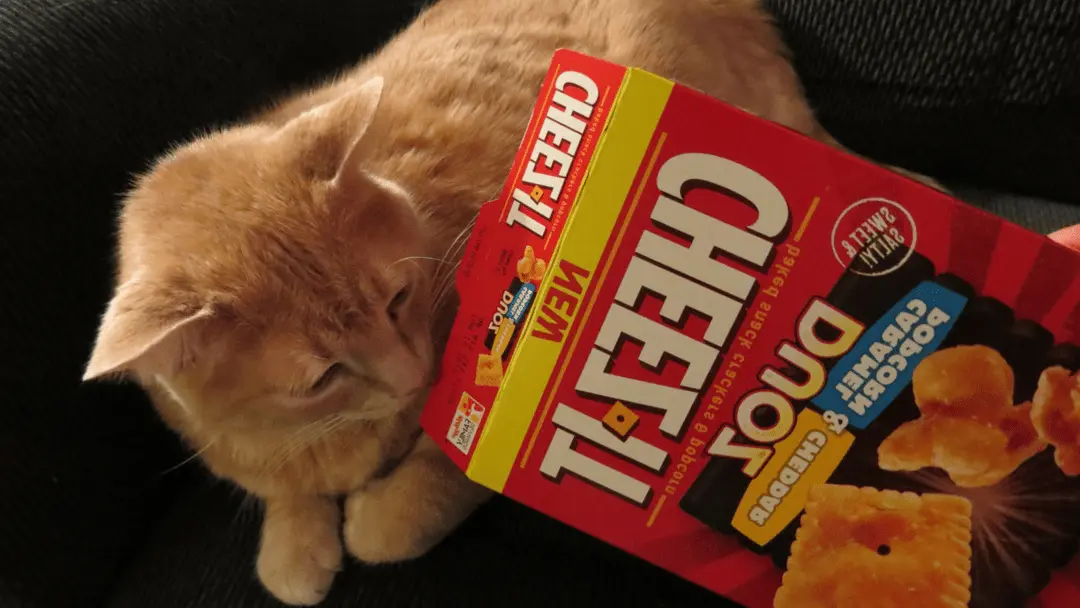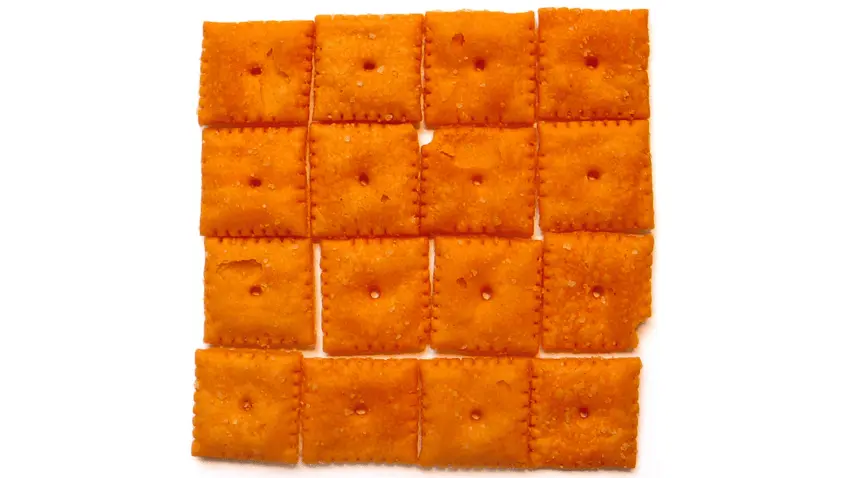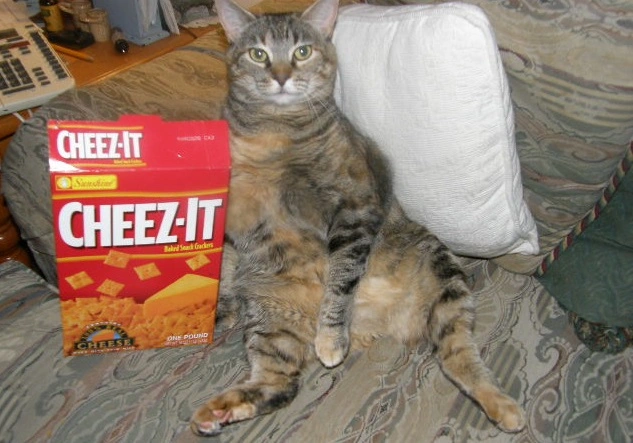Can Cats Eat Cheez-Its? Are There Benefits?
Can cats eat Cheez-Its? This all-time favorite snack may not be toxic to felines, but you should know a few important reminders before you toss your kitty a piece.
Over the years, cats have grown a taste for food items made for humans. Although they are obligate carnivores, they’ve also started to consume non-meat items.

Nevertheless, this doesn’t mean that a cat’s diet has changed or shifted away from its carnivorous nature. It’s just that they’ve proven flexible with whatever food item there may be.
For cat owners who are wondering whether Cheez-It is one of the food items cats can consume, the points I discussed below may help.
What’s in a Cheez-It?

Cheez-It is a popular brand of cheese cracker under the Kellogg Company. The snack has been around for 100 years since its conception in 1921.
These crackers have a square shape with a hole in the middle and rigid edges. Each piece is around one inch in size.
When it comes to ingredients, Cheez-It has enriched flour as its main component. It’s a combination of wheat flour and reduced iron as well as niacin and Vitamin B1 and B2.
Moreover, this is also made of vegetable oil and skim milk cheese. This is paired with small amounts of yeast, salt, paprika, paprika extract, and soy lecithin.
Overall, the ingredients are pretty straightforward and common. Despite that, this product maintains its spot as one of the most beloved snacks in America.
Is it safe for cats to eat Cheez-Its?

Overall, a piece or two of Cheez-It won’t hurt a healthy kitty. However, the following will get in the way of sharing the snack with your pet:
1. Some cats are lactose intolerant.
The major bummer when it comes to this idea is the fact that many cats are lactose intolerant. While not all kitties will have this problem, older cats tend to have problems digesting dairy just like the cheese on Cheez-It.
If your cat is lactose intolerant, it will become gassy when given Cheez-Its. In case your cat consumed a large amount, vomiting and diarrhea may also set in.
Take note that even a single piece of Cheez-It is enough to wreak havoc in the tummy of a lactose-intolerant cat. Excessive flatulence can also become dangerous due to the risk of gastric dilatation-volvulus (GDV).
Even if your pet can digest Cheez-It, the next points below may prove it to be an unfitting snack for a feline.
2. Cheez-It has way too much sodium for cats.
One of the biggest downsides of Cheez-It is the high sodium content. It’s because cats can easily succumb to sodium toxicity due to their sensitivity to salt.
In general, experts recommend that a cat’s food should only contain 0.2% sodium. This is much lower than the sodium intake allowable in canines.
To put it in perspective, a 14-gram serving of Cheez-It contains roughly 87 mg of salt. This is about 20 pieces of the cheesy crackers.
Such an amount of salt makes the snack appealing to human taste buds. However, for cats, it can cause serious health problems.
If your cat experiences vomiting, diarrhea, drooling, and excessive thirst after eating Cheez-It, you should call the vet immediately. This might be the onset of sodium poisoning.
3. Cheez-It doesn’t offer substantial nutrition for cats.
Cheez-It is delicious, but it doesn’t offer substantial nutritional value for felines. After all, it’s designed for humans and not for cats.
To be fair, this snack has Vitamin B1 and B2, which are essential nutrients for cats. However, it’s only present in small amounts and not enough to outweigh the risks of giving Cheez-It to your pet.
Always remember that cats are obligate carnivores. This means that they need to get most of their nutrition from meat sources.
Instead of giving Cheez-It to your kitty as a treat, it’s best to purchase an actual pet treat made for cats. These are often meat-based and have the right balance of safe ingredients.
4. Cheez-It is high in carbs.
In general, carbohydrates should only comprise 10% to 15% of a cat’s diet. The rest should be protein and good fats.
In contrast, 10 pieces of Cheez-Is already have 6.3 grams of carbohydrates. This is way more carbs than what a kitty needs in her diet.
Also, excessive carb consumption will increase the risk of feline obesity. When a cat becomes obese, it will be susceptible to more health problems.
Take note that it’s very easy to lose track of the extra snacks you give your cat. If you don’t factor in the additional treats, your pet will soon gain extra pounds.
Overall, the nutrition your cat gets from its food and treats is enough. While you want to be generous, sharing your cheesy snack with the feline will do more harm than good.
5. Your cat may turn down cat food.
Lastly, getting your cat used to eating Cheez-It and other human snacks may cause dietary problems later on. There’s a possibility that your cat will turn down its kibble because it got accustomed to the taste of Cheez-It.
This problem will be hard to fix as you have to reset your cat’s taste preference. In the long run, you may raise a picky eater.
To prevent this, you should keep the cheesy crackers to yourself. Giving in to your pet’s cute face will be dangerous.
Why do cats love cheese?
Many cats have a love affair with cheese due to its rich taste. It’s also high in fat and protein, which matches their diet.
However, you shouldn’t indulge your kitty in too much cheese. Some cheese types like parmesan and feta have excessive sodium content, which is dangerous for cats.
Aside from that, some felines are lactose intolerant. While they may enjoy the taste of cheese, their digestive system doesn’t have the ability to process it.
What type of cheese can cats eat?
Most cats can tolerate a modest amount of cheese as long as they are not lactose intolerant. The likes of cottage cheese, ricotta cheese, and cream cheese are good options.
Still, the question is whether cats need it or not. When it comes to dietary requirements, cheese isn’t really a necessity for cats.
Overall, it’s best for your cat to enjoy a different snack that offers more nutrients that suit their diet.
Can cats have cheese crackers?
Cheese crackers often contain a lot of salt, which isn’t safe for cats. It’s a snack made for humans, so you should never consider it as the main part of your pet’s diet.
If you want to give your kitty a crunchy snack, you can give it a few pieces of its kibble or a cat treat. These food items are made specifically for felines.
Can I give a kitten Cheez-Its?
You should never give Cheez-It to kittens, especially if they aren’t big enough to consume stiff food. Their tiny teeth and small gums may get injured trying to gnaw on a piece of cracker.
Also, Cheez-It doesn’t have the nutrition kittens need to grow properly. Kittens need a lot of protein from meat and their mothers’ milk to sustain their growth.
If you just rely on human food items like cheesy crackers, your kitten may become stunted and frail. Your pet may also develop a slew of health problems later on.
Can cats eat Cheetos?
Like Cheez-Its, Cheetos are popular for their cheesy and salty flavor. It’s high in sodium and fat, which isn’t a good mix for cats.
Overall, a single piece of Cheetos won’t hurt a kitty. However, you shouldn’t let cats get used to it as this could affect their appetite.
Can cats eat Doritos?
Doritos are classified as junk food for a reason: it doesn’t offer substantial nutrition for both humans and cats.
And just like most human snacks, Doritos chips are reeking of sodium, artificial colors, and artificial flavoring. It’s also made of corn, which is something many cats find hard to digest.
Can cats eat pretzels?
Pretzels are usually made of wheat flour, shortening, yeast, and salt. If prepared with the least amount of salt, this crunchy snack is safe for cats.
Still, you should only give homemade pretzels to your cat since you have control over the ingredients. Avoid flavored and salted types sold in the market as these are usually mixed with loads of artificial preservatives.
Can cats eat goldfish crackers?
Goldfish crackers are somewhat similar to Cheez-It and animal crackers. Both are enriched wheat flour and slathered with salty cheese.
If consumed regularly even in small amounts, this snack can cause sodium poisoning in felines. It can also increase the risk of obesity and picky eating.
Overall, you should avoid sharing goldfish crackers with your pet. Again, cat treats are the best option for felines.
Conclusion
Can cats eat Cheez-Its? While a single piece isn’t usually harmful, you should avoid feeding this snack to your cat.
It’s because Cheez-It is high in salt and has no substantial nutrients to offer animals. It can even trigger stomach upset and expose the kitty to the risk of sodium poisoning.
Remember that cat treats are made for a reason. It’s safer, more nutritious, and suitable for your pet.
